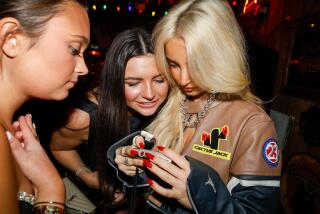Branded as Rebels, Without a Cause
- Share via
They said it in ancient Greece. They said it in Shakespearean England. They even said it in the United States in the 1950s, usually considered a model era for well-behaved--though some might argue over-controlled--teenagers.
They said it so often in the ‘60s, there’s no need to repeat it here.
Now, every six months or so, a poll, a study or an article in a newsmagazine tells us, in case we’ve forgotten, that teenagers are out of control, wild, rude or even scary, callous and immoral.
Last month, People magazine ran a cover story profiling “Kids Without a Conscience.” It included the New Jersey teen who gave birth at her prom and discarded the baby in a trash can, the California youth accused of killing a girl in a Nevada casino bathroom while her father gambled and a pair of teens apparently killing for thrills in New York’s Central Park.
Also in June, most of the several thousand adults polled by the opinion research firm Public Agenda said they did not believe today’s children would grow up to make the world a better place. They called teenagers rude and younger children bratty.
In that survey, as pollsters say often happens in such polls, adults excluded their own children and families from negative judgments. The teenagers surveyed also said their own parents did a good job of raising them--it was the other kids’ irresponsible parents who were the problem.
In real life, teenagers tend to be so segregated from adult life that most people--unless they are one, have one or teach one--are unlikely to really know what teenagers today are like.
In fact, in some areas, in direct contradiction to prevailing public perceptions, teenagers are becoming increasingly responsible, in some cases more than their elders. Consider:
* According to the Alan Guttmacher Institute in New York, teen pregnancy rates have dropped in the 1990s; a higher proportion of teenagers are now using birth control than in 1988; and the level of sexual activity is leveling off, particularly among younger teens.
* The Century Council, a Los Angeles research organization funded by members of the alcohol industry, has found that under-21-year-olds have made important improvements in driving after drinking and riding with others who have been drinking. Roadside breath tests in 1996 showed that younger drivers have much-reduced blood alcohol levels compared to 1986 and 1973--progress that has not been mirrored by adults.
* According to researchers at the Minneapolis-based Search Institute, an organization that seeks to overturn negative attitudes about youths, more young people than adults volunteer to serve their communities.
In a blame-oriented society, the discrepancy between the myth and the reality is most often blamed on a sensation-seeking media. Other theories point to the distortion of simple coverage in a growing population, making such crimes appear more widespread than they are. In still another view, people see what they look for. Some cynics suggest that assistance programs publicize the most negative findings about youths so that they will continue to be funded.
According to family historian Stephanie Coontz, some crimes have plagued us forever. Infanticide, for instance, is less common now than it was in the 19th century. And if thrill crimes are on the rise, perhaps adults should reevaluate the messages they are sending about how to view people who are different from themselves. Perhaps they could start with teens.
In cross-cultural studies of adolescents, Coontz said researchers have consistently found two common characteristics: the “imaginary audience effect” in which teens believe they are the center of attention; and the “invulnerability belief” in which they believe harm will not come to them, even if they have been told the dangers. Yet, as the good news shows, they can and do respond.
If youths are different now than before, it has less to do with them, or even the amount of time their parents spend with them (which Coontz said is as much as it ever was), than to the loss of a useful place in adult society.
Instead of drawing a circle that shuts them out, why not draw one that takes them in? Teens, like anyone else, Coontz said, “will rise to a challenge. But they will also sink to a stereotype.”
*
Lynn Smith’s column appears on Sundays. Readers may write to her at the Los Angeles Times, Life & Style, Times Mirror Square, Los Angeles, CA 90053 or via e-mail at lynn.smith@latimes.com. Please include a telephone number.
More to Read
Sign up for Essential California
The most important California stories and recommendations in your inbox every morning.
You may occasionally receive promotional content from the Los Angeles Times.













